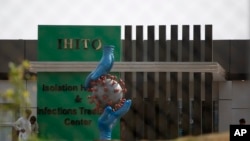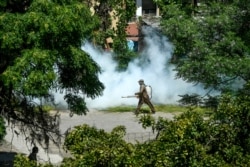Pakistan’s Supreme Court has set aside the government’s partial economic lockdown order, saying the country should not be made “all together dysfunctional” because of the coronavirus.
A five-judge panel, headed by the chief justice, ruled Monday that “millions of workers will be on the streets and the government may be faced with a human disaster and calamity of such a magnitude that to overcome it may become next to impossible.”
The coronavirus pandemic has killed more than 900 people and infected more than 42,000 others in Pakistan, which has a population of 220 million. Officials acknowledge the cases have remained well below the original projections since the outbreak hit the country nearly three months ago.
Pakistan’s Supreme Court ruling praised the official attention to dealing with the outbreak, but stressed all the resources should not be directed to “this one disease, nor the country should be made all together dysfunctional, because of this disease, for its consequences will be highly detrimental to the people of Pakistan.”
Monday’s judicial order is seen a major relief for Prime Minister Imran Khan, who has been under fire from political opponents for not imposing a complete nationwide lockdown in response to the COVID-19 crisis.
Khan has explained that a total nationwide lockdown would have devastating economic consequences for “25% Pakistanis” who live below the poverty line. He warned in a recent speech that an estimated 150 million individuals, including rickshaw drivers, street hawkers, taxi drivers, small shopkeepers, and daily wagers, could eventually face hunger if all of them are shut in their homes.
The Pakistani government, however, has in recent weeks gradually relaxed economic restrictions and allowed for certain industries to resume activities for five days a week.
While invalidating those remaining curbs, the top court Monday instructed authorities to effectively implement social distancing protocols and mandate people wear masks in commercial areas.
Khan’s coronavirus-related policy, however, has faced strong opposition and criticism from the regional government in southern Sindh province, with more than than16,000 confirmed coronavirus cases.
The ruling Pakistan Peoples Party (PPP), a major opposition force at the national level, has ordered a complete lockdown in in Sindh unlike the rest of the country. The move has negatively impacted business activities, particularly in the provincial capital, Karachi, which is Pakistan’s largest city and commercial hub.
The Supreme Court ordered the provincial government to remove all curbs on business activities.
Khan’s government has launched several relief programs to help mitigate effects of the partial lockdown. It has already dispersed cash assistance of 12,000 rupees (approximately $75) each to 12 million low-income families and special financial packages for small business in Pakistan.





